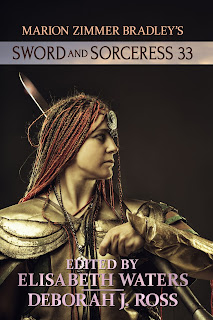Enter a wondrous universe…the latest volume of Sword and Sorceress featuring stories
from new and seasoned authors. Herein you will find tales of fantasy with strong female characters, with some version of either martial skill or magic.
Not all the protagonists will be human, and sometimes the magic will take
highly original forms, but the emotional satisfaction in each story and in the
anthology as a whole, remains true to the original vision. The release date will
be November 2, 2018.
Kindle: https://amzn.to/2NitlHH
Deborah J. Ross: Tell
us a little about yourself. How did you
come to be a writer?
Evey Brett: I
wrote stories when I was a kid and through high school, then I went to music
school and stopped reading or writing anything that wasn’t college-related.
Toward the end of my degree, I was having a hard time with music and needed a
different creative outlet, so I started writing a bit of fan fiction. My first
trunk novel started as a Star Trek TNG/DS9 crossover. I soon realized that
would never sell, so I transposed the plot into a fantasy world and went to the
library for writing books so I could learn how to write better. I took some
community college classes with some very good writing teachers, and got into
Clarion, and eventually started selling stories.
DJR: What
inspired your story in Sword and
Sorceress 33?
EB: I actually
wrote this story for a different editor who asked for something from me but
eventually turned it down. Since then it’s been through a couple overhauls and
I’m glad it found a home.
DJR: What authors
have most influenced your writing? What
about them do you find inspiring?
EB: Mercedes
Lackey comes to mind first, because toward the end of college, when I started
reading again, her books happened to be the first ones I picked up—and soon
enough I had a collection of all the Valdemar books. When I read the Magic’s Pawn trilogy back in 2001 or so,
I finally realized what “gay” meant—and soon after I started writing, gay
characters and telepaths started seeping into my work and stayed there. And,oddly
enough,my own Companion, a Lipizzan mare named Carrma, showed up and picked me
and she’s been a huge influence on my life and writing.
DJR: Why do you
write what you do, and how does your work differ from others in your genre?
EB: I don’t have
any great and wonderful reason why I write what I do; it’s just what comes out,
and often colored by my latest interests. Like when I first met a herd of
Lipizzan horses and did horse yoga (not so much poses as an energetic exchange)
I wrote a couple books involving Lipizzans and energy manipulation.
How is it different? I like to think that I focus on
characters and their emotions and psychology—what makes them tick and how can
they overcome whatever trauma or hard times they’ve been through. I do write
mostly queer characters, but I don’t make a big deal about that; they’re
accepted for who they are and don’t have to figure out what it means to be
queer or fight for it. They just are.
DJR: How does
your writing process work?
EB: It’s mostly
just whatever comes to mind. I don’t write stories in order; they come in
pieces. I’ll think of an interesting bit of dialog here, a scene there, and
keep adding things until the story starts to develop a plot. Then I make it
tighter, “glue” together the bits of unfinished scenes, and then I have a
story. Sometimes they need some research, and I’ll get a pile of books from the
library or go out on an adventure, though I’ve never had much patience for
notes or outlining.
DJR: What have
you written recently? What lies ahead?
EB: I have a
couple recent stories in Crossroads of
Darkover and Survivor, which is
from Lethe Press. At this point, it’s just writing one story at a time, mostly
for anthology calls; I haven’t had much luck with standalone stories. I’m also
endeavoring to refurbish and reprint my quartet of novels since the publisher
closed.
DJR: What advice
would you give an aspiring writer?
EB: Write what
feels right for you, but learn how to do it well. Read books on writing. Find a
crit group, online or in person; giving feedback is just as important as
getting it so you can understand what a well-written story looks like. Go to
workshops if you can, or local SF/F cons to learn more. Be humble. Be kind.
Evey
Brett lives in the Arizona desert where she enjoys catching creepy-crawlies
like snakes, scorpions, tarantulas and Gila monsters and is the willing servant
of several cats and a Lipizzan mare who has a habit of arranging the universe.
She’s attended Clarion, Taos Toolbox and the Lambda Literary Retreat for
Emerging LGBT Writers and is a first reader for the Magazine of Fantasy and
Science Fiction. She has numerous novels andshort stories in anthologies such
as The Myriad Carnival, Daughters of Frankenstein, Masques of
Darkover, Crossroads of Darkover, and elsewhere. She can be found online at
eveybrett.wordpress.com.


No comments:
Post a Comment